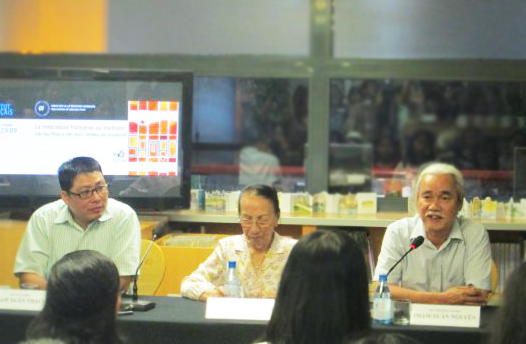
“La Littérature française au Vietnam”, the first in a series of monthly seminars about the French literature in Vietnam, took place at the French cultural center L’espace, on September 23, 2015. The event attracted many seasoned teachers, researchers, and translators of the language, as well as interested students and graduates.
Existing for almost 150 years in Vietnam, the French language and literature have become part of the country’s artistic life. Looking into history and cultural development, three esteemed guest speakers chaired the discussion, offering fresh perspectives.
- Professor Lê Hồng Sâm, a former professor of French literature, acclaimed translator and poet. Growing up in the late 1930s when Vietnam was still a French colony and Vietnamese literature was secondary to a French education, she studied the French language intensely. Professor Sâm shared her vivid childhood anecdotes of immersing in the French literary world, its magical power that sustained her throughout the 1st and 2nd Indochina Wars, and later in her teaching and mentoring career.
- Dr. Phạm Xuân Thạch, head of the Literature faculty, the University of Social Sciences and Humanities. Dr. Thach entered university in 1991, a pivotal year marking the end of the Soviet Union. Therefore, he experienced first-hand this transition from a Soviet-influenced Vietnam to a modern country having its own identity. He also reflected on the current lacking of quality lecturers, especially in foreign-language literature, i.e. French, Russian, Japanese, and American literature.
- Literary critic and translator Phạm Xuân Nguyên. He talked about four major foreign literary streams in Vietnam: Chinese, French, Soviet, and English. Mr. Nguyên put forward an interesting question, “Is the fate of the French literature in Vietnam “CONDITIONED” to be declining, or does it have an internal fire that continues to kindle?” This points to the fact that we have seen an unprecedented growth of the English language, whereas that of the French or Russian seems to play an inferior role.
The answer exists in the large volumes of quality translation that readers of all ages enjoy. Some outstanding, widely-read authors were Rousseau, Hugo, Proust, Balzac, Flaubert, Maupassant, Stendhal, Sartre, Baudelaire, Verlaine , Antoine de Saint-Exupery, and the two recent Nobel Laureates Le Clezio (2008) and Patrick Modiano (2014). “The Little Prince” (Le petite prince) is perhaps the most widely read and loved.
I have detailed notes of the seminar; however, some points need discussing to put in this blog. The following questions should encapsulate the main points discussed:
– Is it, now in Vietnam, still relevant to study the French language? – to study French literature? – to study literature, at all?
– Why read foreign literature? What universality exists between Vietnamese literature and the world literature?
– Is translating a piece of literature equivalent to “Comparative literature”, an academic field? What can be done to improve the quality of the translation?
For my part, I probed a question about the correlation between History and Literature; what to keep in mind when approaching a piece of historical fiction, specifically Stendhal’s seminal work “Le Rouge et le Noir” (The Red and the Black, 1830).
Professor Sâm responded with equanimity, explaining the historical background of this novel. The Red coats, the Black robes, the eagle in the sky, the fall of Napoléon Bonaparte, the new proletariats’ desire to break through the social ladders. She emphasized that while History and Politics do play a role in literature, we can always find out the universal themes in it: youth, friendship, love, hate, doubt, happiness, compassion, honor, pity, greed, and so on. Read literature to think and see differently, to have civil conversations across the differences in languages, and to understand your “self”.
What exactly is the point of living? Is happiness the sole purpose of living? What is crime and what is justice? What is friendship and why do we need it? …
This seminar asks more critical questions to the readers of literature, which I like a lot. Inspiring teachers and possibly life-changing books are not automatically available for me, which is why I need to keep searching. It is a long-term aspiration to find myself the answers.
